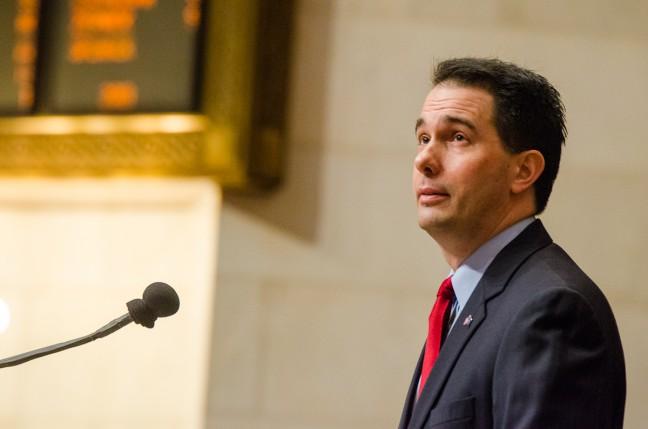During his visit to University of Wisconsin-Stout Monday, Gov. Scott Walker showed support for investing in certain aspects of higher education — but not the entire UW System.
Walker recently visited laboratories on UW-Stout’s campus to show his support of higher education.
Walker told Leader-Telegram he might invest in Wisconsin’s technical colleges to meet high job demand, citing that Wisconsin currently has more than 92,000 job openings.
Walker did not mention anything about investing in other four-year institutions, such as UW-Madison.
Cheryl Hanley-Maxwell, associate dean and professor in UW-Madison’s School of Education’s rehabilitation psychology and special education department, said she thinks what distinguishes UW-Stout from UW-Madison is that it’s a polytechnic university, meaning it focuses on training students in technical fields rather than the broadened education of liberal arts universities like UW-Madison.
One highly regarded program, Fab Labs, focuses on teaching students technical skills, Hanley-Maxwell said. Fab Labs was among the laboratories Walker visited on UW-Stout’s campus.
After his visit, Walker told Leader-Telegram he wants to focus on the challenge of filling jobs here in Wisconsin.
“The bigger challenge the state has is finding enough people with the skill set to fill those jobs and opportunities,” Walker told Leader-Telegram.
Carl Vieth, director of corporate education for UW-Madison’s department of engineering professional development, said he supports Walker’s efforts to invest in technical colleges but thinks the focus needs to be on the entire educational system.
“I applaud the government for supporting education at the technical level,” Veith said. “I think that’s important, but equally important is supporting the University System.”
Hanley-Maxwell said Wisconsin needs to focus on more than just technical skills to stimulate job growth, even if it’s hard to see how liberal arts degrees relate to specific occupations in the job market.
Hanley-Maxwell said she thinks the lack of funding for higher education reflects the government’s lack of trust in universities to place students in jobs after graduation.
Vieth said graduates of technical colleges and four-year universities are not very comparable because they have very different applications in the job market.
“It’s not like we’re not providing work-ready, highly desirable employees,” Veith said. “It’s just that they’re at a very different level than what would fill an immediate need for a very limited technical expertise.”
Vieth said even if UW-Madison focuses less on technical skills, the broader scope and emphasis on research in a UW-Madison education will make it the kind of university that provides the work force with “technology leaders.”
Vieth said Walker is also ignoring the importance of research for the future of Wisconsin. UW-Madison focuses on advanced research, such as work being done at Grainger Institute for Engineering, that can be applied to manufacturing jobs, Vieth said.
Vieth said if the government only focuses its funding toward technical colleges, the future of Wisconsin is at risk.
“We also need to be looking at the work force of next year and years down the road,” Vieth said. “We’re at risk of losing our leadership.”













